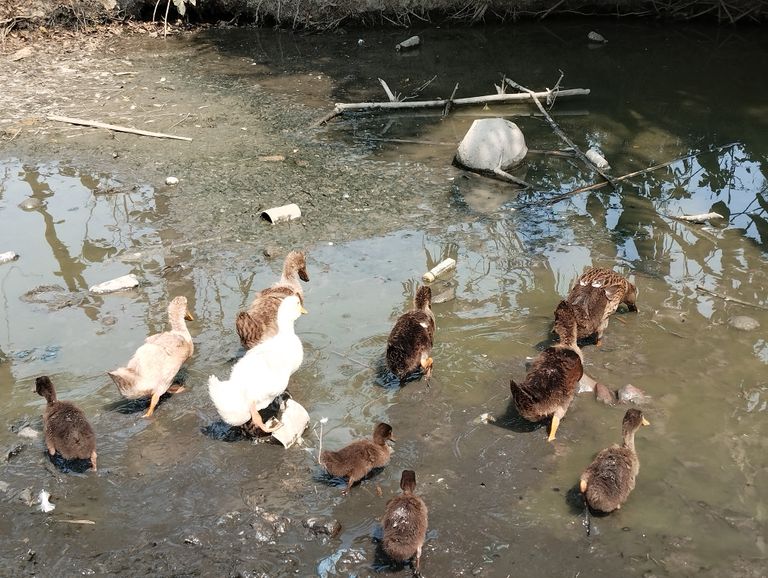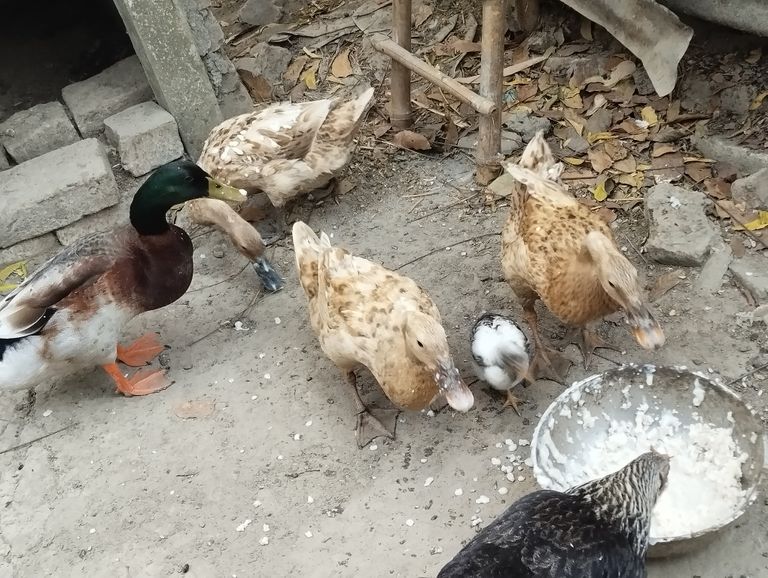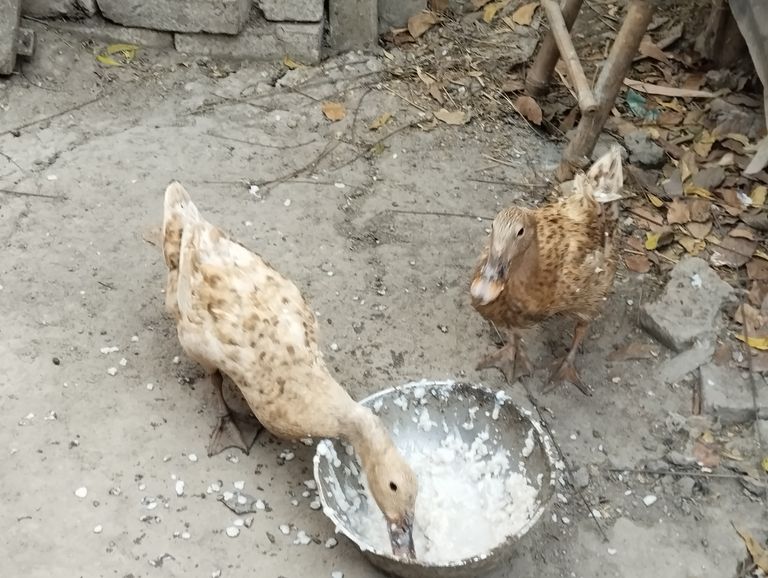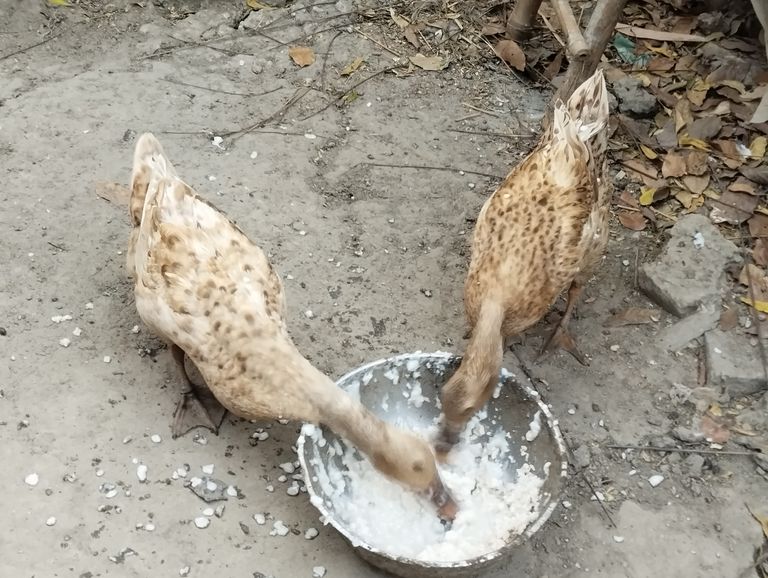
Complete Feeding Guide for Domestic Ducks Pati Hans.
Domestic ducks, commonly known as "Pati Hans" in Bengali, are an excellent choice for poultry farming due to their adaptability and high egg and meat production. Proper nutrition is essential to keep ducks healthy and productive. In this guide, we will discuss the best diet for domestic ducks, including natural and commercial feed options, feeding schedules, and special care during different growth stages.
- Nutritional Requirements of Domestic Ducks
Ducks require a balanced diet containing essential nutrients such as:
Proteins: Necessary for growth, feather development, and egg production.
Carbohydrates: Provide energy and maintain body functions.
Fats: Support energy reserves and healthy skin.
Vitamins and Minerals: Strengthen immunity, bone health, and overall well-being.
Water: Ducks need constant access to clean, fresh water for digestion and hydration.
- Types of Duck Feed
A. Natural Feed for Ducks
Ducks enjoy a variety of natural foods that can be found in their environment. These include:
- Aquatic Plants and Algae – Ducks naturally feed on duckweed, water lettuce, and algae found in ponds.
- Insects and Small Animals – They eat snails, earthworms, small fish, and insect larvae, which provide essential proteins.
- Grains and Seeds – Rice, wheat, maize, barley, and sorghum are great sources of carbohydrates.
- Vegetables and Kitchen Scraps – Lettuce, spinach, cabbage, and leftover vegetables can be added to their diet.
- Fruits – Ducks enjoy soft fruits like banana, papaya, and watermelon in moderation.
B. Commercial Duck Feed
For higher production and ease of feeding, farmers often prefer commercial feed, which is scientifically formulated to meet ducks' nutritional needs.
- Starter Feed (0-3 Weeks Old) – 18-22% protein to support rapid growth.
- Grower Feed (4-6 Weeks Old) – 14-16% protein for muscle and feather development.
- Layer Feed (7 Weeks and Older for Egg-Laying Ducks) – 16-18% protein with added calcium to ensure strong eggshells.
- Finisher Feed (for Meat Ducks) – High-energy feed to promote weight gain before market.
- Feeding Schedule for Ducks
- Essential Feeding Tips for Healthy Ducks
Always provide clean drinking water next to their food, as ducks need water to swallow and digest properly.
Avoid feeding moldy or spoiled food as it can cause illness.
Grit (small stones or crushed shells) should be available to help ducks grind food in their gizzard.
Offer extra calcium sources like crushed oyster shells or eggshells for laying ducks.
Reduce the amount of salty or processed foods, as they can harm ducks.
- Seasonal Feeding Adjustments
Summer Diet
Increase water-rich foods like fruits and fresh greens.
Ensure ducks have access to cool, clean water throughout the day.
Winter Diet
Provide high-energy grains like corn and wheat to maintain body warmth.
Add extra proteins like cooked beans or mealworms for better immunity.
- Special Care for Ducklings
Ducklings require extra care and specific nutrition for survival and growth.
Provide a warm and safe environment for the first few weeks.
Use a finely ground starter feed with 20-22% protein.
Avoid feeding ducklings large grains or tough foods as their beaks and digestive systems are still developing.
Do not feed them medicated chick feed, as some ingredients can be harmful to ducks.
- Home-Made Duck Feed Recipe
For those who prefer natural feeding, here is a simple homemade duck feed mix:
Ingredients:
40% Crushed Corn
30% Wheat or Rice Bran
20% Soybean Meal or Fish Meal
5% Crushed Oyster Shells or Eggshells
5% Vegetable Scraps and Greens
Preparation:
- Mix all the dry ingredients thoroughly.
- Store in a cool, dry place.
- Feed fresh portions daily with access to water.
- Conclusion
Providing a balanced and nutritious diet is essential for raising healthy and productive domestic ducks. Whether using natural or commercial feed, ensuring the right balance of protein, carbohydrates, vitamins, and minerals will result in optimal growth and egg production. With proper feeding and care, ducks can be a profitable and sustainable addition to any farm.
By following this guide, you can ensure that your ducks remain healthy, energetic, and productive throughout their lifespan.


Health Benefits of Eating Domestic Duck Eggs
Duck eggs, particularly from domestic breeds like the Pati Hans (local duck), are highly nutritious and offer numerous health benefits. Compared to chicken eggs, they have a richer flavor, a firmer texture, and a higher concentration of essential nutrients. In this blog, we will explore the various benefits of consuming domestic duck eggs, their nutritional value, and how they contribute to overall health.
- Nutritional Value of Duck Eggs
Duck eggs are packed with essential nutrients that support overall health. Here’s a breakdown of their key nutritional components:
Protein: Duck eggs contain more protein than chicken eggs, which helps in muscle growth, tissue repair, and overall body strength.
Healthy Fats: They have a higher fat content, including beneficial omega-3 fatty acids that support brain function and heart health.
Vitamins and Minerals: Duck eggs are rich in vitamins A, D, E, and B-complex, along with minerals like iron, selenium, and zinc.
Antioxidants: The yolk is high in antioxidants like lutein and zeaxanthin, which protect eye health.
Choline: Essential for brain development, memory function, and liver health.
- Health Benefits of Eating Duck Eggs
A. Boosts Immunity
Duck eggs are rich in selenium and zinc, both of which play a vital role in strengthening the immune system. Regular consumption helps the body fight off infections and diseases.
B. Supports Brain Health
The high choline and omega-3 fatty acid content in duck eggs improve cognitive function, memory retention, and overall brain performance. It is especially beneficial for children and elderly individuals.
C. Promotes Heart Health
Despite having a higher fat content than chicken eggs, the fats in duck eggs are mostly healthy. Omega-3 fatty acids help reduce bad cholesterol (LDL) levels while increasing good cholesterol (HDL), reducing the risk of heart disease.
D. Enhances Eye Health
Lutein and zeaxanthin, powerful antioxidants found in duck eggs, help protect the eyes from oxidative stress, reducing the risk of cataracts and age-related macular degeneration.
E. Strengthens Bones and Teeth
The high levels of vitamin D and calcium in duck eggs contribute to stronger bones and teeth, preventing conditions like osteoporosis.
F. Improves Skin and Hair Health
Vitamin E, biotin, and other antioxidants present in duck eggs nourish the skin and hair, promoting a youthful appearance and reducing the signs of aging.
G. Supports Muscle Growth and Recovery
Duck eggs have a higher protein content than chicken eggs, making them an excellent food choice for athletes, bodybuilders, and individuals recovering from injuries.
H. Helps in Weight Management
Since duck eggs are more filling than chicken eggs, they help control appetite and prevent overeating, making them a good option for weight management.
- Duck Eggs vs. Chicken Eggs: Which Is Better?
While both duck and chicken eggs have their benefits, duck eggs are a more nutrient-dense option. However, individuals with cholesterol concerns should consume them in moderation.
- How to Include Duck Eggs in Your Diet
Duck eggs can be used in various recipes just like chicken eggs. Here are some delicious ways to enjoy them:
Scrambled Duck Eggs – A protein-rich breakfast option.
Duck Egg Omelet – Mixed with vegetables for a nutrient boost.
Baking – Duck eggs make cakes and pastries fluffier and richer.
Hard-Boiled Duck Eggs – A great snack packed with protein.
Pickled Duck Eggs – A traditional preservation method that enhances taste and texture.
- Are There Any Side Effects?
While duck eggs are highly nutritious, some people may need to consume them cautiously:
High Cholesterol Content – Those with high cholesterol should eat them in moderation.
Allergies – Some individuals may be allergic to duck eggs, though it’s less common than chicken egg allergies.
Storage – Due to their larger size and higher fat content, duck eggs should be stored properly to avoid spoilage.
Conclusion
Duck eggs, especially from domestic breeds like the Pati Hans, are a powerhouse of nutrition. They offer superior protein, healthy fats, vitamins, and minerals, making them an excellent addition to a balanced diet. Whether you are looking to boost immunity, improve brain function, or maintain overall health, duck eggs are a great natural food choice. However, it is essential to consume them in moderation and ensure proper storage for the best results. Would you like to try duck eggs in your meals? Let us know in the comments.

Rearing Domestic Ducklings: A Complete Guide
Domestic duck farming is an excellent way to produce eggs, meat, and even provide pest control in farms and gardens. Rearing ducklings properly is crucial to ensure their healthy growth and productivity. This guide will cover all essential aspects of raising domestic ducklings, from brooding to feeding, housing, and disease prevention.
- Choosing the Right Breed
Before starting, selecting the appropriate duck breed is essential. Some popular domestic duck breeds include:
Pekin Ducks – Fast-growing and excellent for meat production.
Khaki Campbell – High egg production (250–300 eggs per year).
Indian Runner – Good for egg production and pest control.
Muscovy Ducks – Quiet and excellent for meat.
Rouen Ducks – Similar to Mallards, good for meat and ornamental purposes.
- Setting Up a Brooder for Ducklings
A brooder is a warm, secure place where ducklings stay during the first few weeks of life.
a. Temperature Control
The ideal brooding temperature for ducklings:
Week 1: 32-35°C (90-95°F)
Week 2: 29-32°C (85-90°F)
Week 3: 26-29°C (80-85°F)
Week 4: Gradually reduce to 21°C (70°F)
Use a heat lamp or brooder heater. Ensure that ducklings can move away from the heat if they feel too warm.
b. Bedding and Cleaning
Use straw, pine shavings, or rice husk as bedding.
Change the bedding daily to keep it dry and prevent diseases.
Avoid newspaper as it is too slippery and can cause leg problems.
- Feeding and Nutrition
Ducklings require a balanced diet for optimal growth.
a. Starter Feed (0-2 Weeks)
Use non-medicated chick starter feed (20-22% protein).
Avoid medicated feed, as ducks eat more than chicks and can overdose on medication.
b. Grower Feed (3-6 Weeks)
Transition to a grower feed with 16-18% protein.
Provide grit (small stones) to help digestion.
c. Finisher Feed (7 Weeks and Beyond)
Use maintenance feed with 14-16% protein for ducks raised for eggs or meat.
Supplement with fresh greens, vegetables, and grains.
d. Water Supply
Ducklings need plenty of clean, fresh water at all times.
Use shallow water containers to prevent drowning.
Water helps them swallow food properly.
- Housing and Space Requirements
Providing adequate housing is crucial for keeping ducklings safe and comfortable.
a. Indoor Housing
A well-ventilated coop or shed with proper bedding.
Space Requirement:
0-4 weeks: 0.3-0.5 sq. ft. per duckling
4+ weeks: 2-3 sq. ft. per duck
b. Outdoor Space and Pond Access
Ducks love water, so if possible, provide access to a small pond or shallow tub.
Secure fencing to protect them from predators.
- Health and Disease Prevention
Proper care and hygiene prevent common duckling diseases.
a. Common Diseases
Duck Virus Hepatitis – Affects young ducklings; vaccination is recommended.
Botulism – Caused by spoiled food or stagnant water; keep food and water clean.
Worm Infestation – Deworm ducks every few months.
Niacin Deficiency – Causes leg problems; supplement with brewer’s yeast in feed.
b. Hygiene and Biosecurity
Clean water and feed containers daily.
Keep bedding dry and replace it regularly.
Quarantine new ducks before introducing them to the flock.
- Growth Stages and Market Readiness
0-6 Weeks: Rapid growth, feathers start developing.
6-10 Weeks: Full feather growth, meat ducks reach slaughter weight (~3-4 kg).
10-20 Weeks: Egg-laying breeds start maturing.
20+ Weeks: Ducks begin laying eggs (depending on breed).
- Final Tips for Success
Provide a stress-free environment for optimal growth.
Avoid overcrowding to reduce disease risk.
If raising ducks for eggs, ensure proper nesting boxes (one per 4-5 ducks).
Ducks love to forage—allow access to grassy areas and insects for a natural diet boost.
Raising ducklings requires patience, proper care, and management, but the rewards are worth it. Whether for eggs, meat, or simply as farm companions, well-raised ducks contribute to a sustainable and productive homestead. Let me know if you need more details or a specific focus.

Rearing Domestic Ducklings: A Complete Guide
Domestic duck farming is an excellent way to produce eggs, meat, and even provide pest control in farms and gardens. Rearing ducklings properly is crucial to ensure their healthy growth and productivity. This guide will cover all essential aspects of raising domestic ducklings, from brooding to feeding, housing, and disease prevention.
- Choosing the Right Breed
Before starting, selecting the appropriate duck breed is essential. Some popular domestic duck breeds include:
Pekin Ducks – Fast-growing and excellent for meat production.
Khaki Campbell – High egg production (250–300 eggs per year).
Indian Runner – Good for egg production and pest control.
Muscovy Ducks – Quiet and excellent for meat.
Rouen Ducks – Similar to Mallards, good for meat and ornamental purposes.
- Setting Up a Brooder for Ducklings
A brooder is a warm, secure place where ducklings stay during the first few weeks of life.
a. Temperature Control
The ideal brooding temperature for ducklings:
Week 1: 32-35°C (90-95°F)
Week 2: 29-32°C (85-90°F)
Week 3: 26-29°C (80-85°F)
Week 4: Gradually reduce to 21°C (70°F)
Use a heat lamp or brooder heater. Ensure that ducklings can move away from the heat if they feel too warm.
b. Bedding and Cleaning
Use straw, pine shavings, or rice husk as bedding.
Change the bedding daily to keep it dry and prevent diseases.
Avoid newspaper as it is too slippery and can cause leg problems.
- Feeding and Nutrition
Ducklings require a balanced diet for optimal growth.
a. Starter Feed (0-2 Weeks)
Use non-medicated chick starter feed (20-22% protein).
Avoid medicated feed, as ducks eat more than chicks and can overdose on medication.
b. Grower Feed (3-6 Weeks)
Transition to a grower feed with 16-18% protein.
Provide grit (small stones) to help digestion.
c. Finisher Feed (7 Weeks and Beyond)
Use maintenance feed with 14-16% protein for ducks raised for eggs or meat.
Supplement with fresh greens, vegetables, and grains.
d. Water Supply
Ducklings need plenty of clean, fresh water at all times.
Use shallow water containers to prevent drowning.
Water helps them swallow food properly.
- Housing and Space Requirements
Providing adequate housing is crucial for keeping ducklings safe and comfortable.
a. Indoor Housing
A well-ventilated coop or shed with proper bedding.
Space Requirement:
0-4 weeks: 0.3-0.5 sq. ft. per duckling
4+ weeks: 2-3 sq. ft. per duck
b. Outdoor Space and Pond Access
Ducks love water, so if possible, provide access to a small pond or shallow tub.
Secure fencing to protect them from predators.
- Health and Disease Prevention
Proper care and hygiene prevent common duckling diseases.
a. Common Diseases
Duck Virus Hepatitis – Affects young ducklings; vaccination is recommended.
Botulism – Caused by spoiled food or stagnant water; keep food and water clean.
Worm Infestation – Deworm ducks every few months.
Niacin Deficiency – Causes leg problems; supplement with brewer’s yeast in feed.
b. Hygiene and Biosecurity
Clean water and feed containers daily.
Keep bedding dry and replace it regularly.
Quarantine new ducks before introducing them to the flock.
- Growth Stages and Market Readiness
0-6 Weeks: Rapid growth, feathers start developing.
6-10 Weeks: Full feather growth, meat ducks reach slaughter weight (~3-4 kg).
10-20 Weeks: Egg-laying breeds start maturing.
20+ Weeks: Ducks begin laying eggs (depending on breed).
- Final Tips for Success
Provide a stress-free environment for optimal growth.
Avoid overcrowding to reduce disease risk.
If raising ducks for eggs, ensure proper nesting boxes (one per 4-5 ducks).
Ducks love to forage—allow access to grassy areas and insects for a natural diet boost.
Raising ducklings requires patience, proper care, and management, but the rewards are worth it. Whether for eggs, meat, or simply as farm companions, well-raised ducks contribute to a sustainable and productive homestead. Let me know if you need more details or a specific focus.